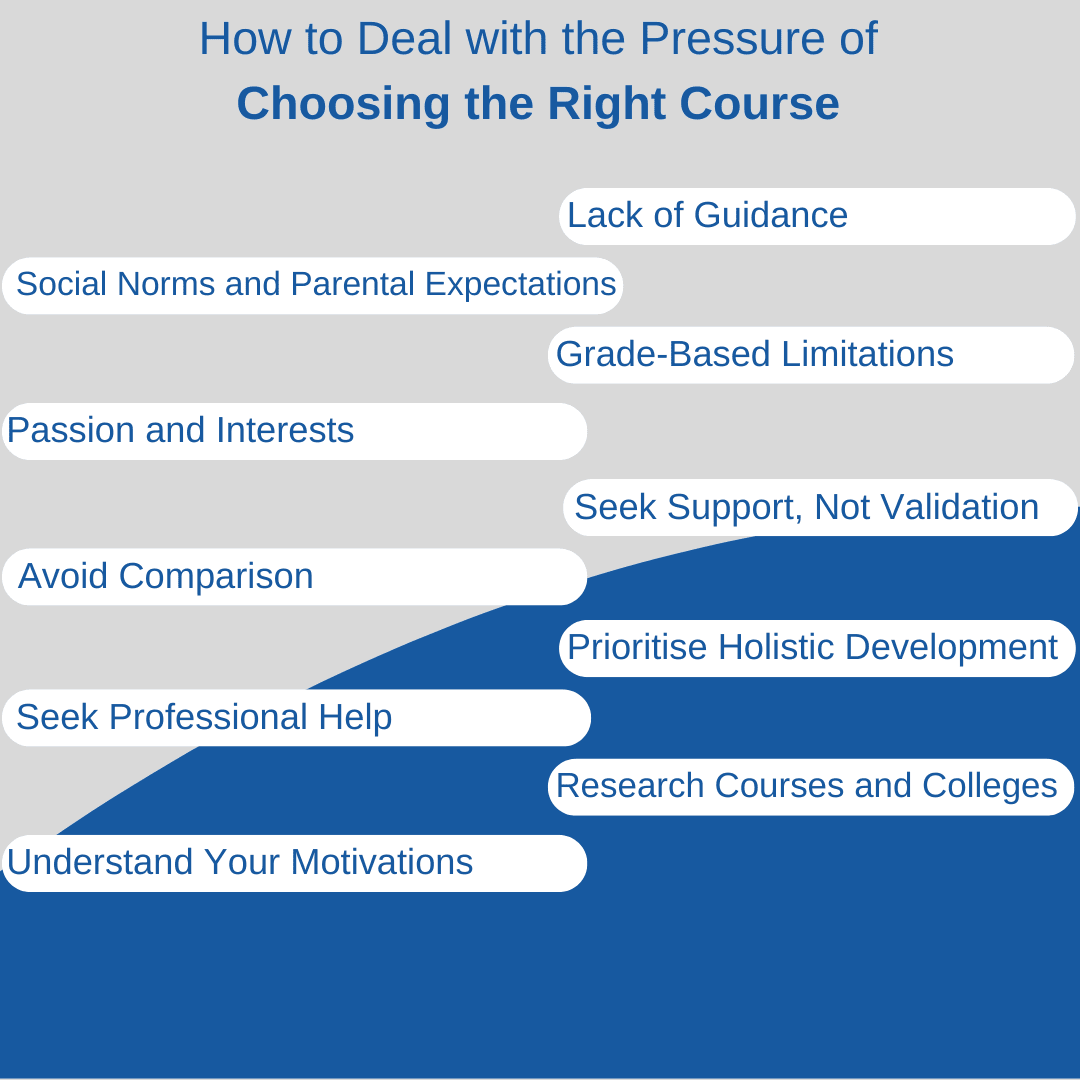In today's fast-moving world, students need help to pick the right academic path. Many forget about mental health, but it's crucial for making such big decisions. The saying "A healthy mind resides in a healthy body" is significant here. A balanced and healthy mindset is key to determining the best educational route.
Choosing a course feels even heavier because it shapes your whole future career. While many job options exist, picking the right course comes with challenges. Balancing what you want with what others expect, like your family or society, can take time and effort. It takes a lot of mental strength to juggle all of that.

Social Norms and Parental Expectations
From a young age, students are often conditioned to pursue careers deemed respectable or lucrative by their families and societal norms. This external pressure can create an internal conflict, as students may feel obligated to sacrifice their genuine passions and interests to meet these expectations. For instance, a student with a natural inclination towards the arts may feel pressured to pursue a more conventional career path, such as engineering or medicine, due to societal perceptions or family traditions.
Lack of Guidance
Navigating the vast array of academic and career options can be overwhelming, especially for students who need more proper guidance and mentorship. With a clear understanding of their strengths, weaknesses, and career prospects, students may find themselves in a sea of choices, able to make an informed decision. This lack of guidance can lead to indecision, anxiety, and regret down the line.
Study Abroad With Studyinfocentre
Grade-Based Limitations
The belief that higher grades equate to better courses and colleges has created an unhealthy obsession with academic performance. Students often chase after high marks, neglecting the true essence of learning and personal growth. This tunnel vision can lead to burnout, anxiety, and disillusionment with the educational process itself.
Follow Your Passion and Interests
Rather than allowing external pressures to dictate their choices, students should strive to identify their true passions and interests. They increase their chances of fulfilment and success in their chosen field by aligning their academic pursuits with their genuine curiosities and natural talents. For instance, students with a deep fascination for the natural world and a knack for problem-solving may find their calling in environmental sciences or sustainable engineering rather than succumbing to societal pressures to pursue a more conventional path.
For example, students who find joy in creative writing and storytelling may realise their passion lies in literature, journalism, or creative arts. Conversely, a student with a keen eye for detail and a love for problem-solving may gravitate toward engineering, computer science, or architecture.
Similar Topic: How to select the perfect course at UG level?
Seek Support, Not Validation
While seeking guidance from parents, mentors, or trusted advisors can be invaluable, it is crucial to understand that the final decision rests solely with the individual student. These supportive figures should serve as sources of information, encouragement, and guidance but not as validators or gatekeepers of one's aspirations. Open and honest conversations with these individuals can provide valuable insights and perspectives. Still, the ultimate choice should be made with a clear understanding of one's values, goals, and aspirations.
Avoid Comparison and External Influences
In the age of social media and influencer culture, it is easy to fall into the trap of comparison and external validation. However, it is crucial to resist the temptation to base one's decisions solely on what others are doing or what is perceived as "trendy" or "prestigious." Each individual's journey is unique, and comparing oneself to others can breed dissatisfaction and self-doubt. Instead, students should focus on their values, strengths, and aspirations and make choices that align with their authentic selves.
You Might Also Like: How to select a course for studying abroad?
Prioritise Holistic Development
While academic excellence is essential, it should not come at the expense of one's well-being. Students should strive to develop well-rounded emotional and social competencies, such as resilience, empathy, and practical communication skills. Regardless of their chosen career path, these skills will serve them well in the real world. Furthermore, a balanced approach to personal growth can alleviate the pressure associated with academic performance and provide a more fulfilling educational experience.
Seek Professional Help
If the pressure becomes overwhelming, or if students find themselves struggling with mental health issues such as anxiety, depression, or burnout, it is imperative to seek professional help. Counsellors, therapists, and mental health professionals can provide valuable support and coping strategies to navigate these challenges. By prioritising their mental well-being, students can approach decision-making with a more transparent and more resilient mindset.
|
Research Courses and Colleges
Once students have identified their areas of interest, they should research the courses and colleges that align with their goals. This research should encompass various aspects, such as course curricula, career prospects, faculty expertise, campus culture, and alums networks.
In addition to traditional methods like college fairs and campus visits, students can leverage online resources, such as university websites, course catalogues, and virtual tours, to gather comprehensive information. They can also contact current students or alums to gain firsthand insights into the program and its real-world applications.
Understand Your Motivations
As students explore their options, reflecting on their motivations for choosing a particular course is crucial. They should ask themselves questions such as:
- Am I genuinely interested in the subject matter and potential career path, or am I influenced by external pressures or misconceptions?
- Will this course allow me to pursue my passions and develop my skills?
- Does the course align with my values, goals, and long-term aspirations?
By examining their motivations, students can ensure that their decisions are rooted in authentic interests and personal fulfilment rather than fleeting trends or external influences.
